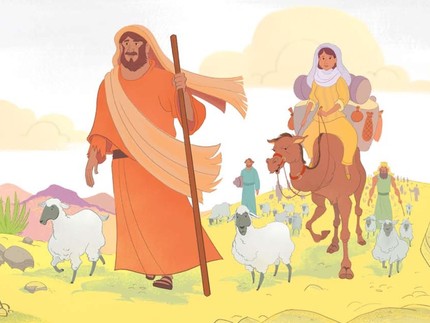
Starting over is no fun. There is the admission that you aren't where you need to be. Then there's the realization that you need to change your location, change your focus, and change a whole lot more. Up for that?
Abram was. He and Sarai had the good life in Haran. He had everything he needed, except one thing. An heir. Unable to have children, there was no legacy to his life, no meaning in his life.
That is, until God discovers this one individual of exceptional faithfulness and decides to build the promise of new life in Abram. (Previous strategies had failed (see Noah and flood). This is a new gambit.) The promise from God is extravagant, as God always is; heirs galore! Abram responds without apparent question. He and Sarai and his entire household pick up and go at God's command.
Destination? Not to worry; God will take care of everything. Does that work for you? You see, this is why Abram is regarded as the epitome of faithfulness in both Jewish and Christian traditions.
On the other hand, change is a real problem for Nicodemus in the selection from John's gospel. Playing with the imagery of light and dark as John's editor was fond of doing, this leader of the Pharisees comes to visit Jesus at night. It would be very helpful to know what Nicodemus' motivation was in making this excursion. His positive comments toward Jesus suggest that he may simply have wanted to know more about the good news that Jesus was preaching and teaching.
The conversation doesn't go well, however. Jesus' response doesn't match at all with Nicodemus's opening statement, and we find the dialogue lurching as Jesus leads Nicodemus along. However, Nicodemus can never quite catch up or catch on to what Jesus is talking about.
Nicodemus is evidence of our own problems with seeing things in a new light, embracing life-giving change, and working our way forward to make change in our lives. It is as if we discover a prison that has captured our lives and we're unwilling to break free and move forward with the faithfulness of Abram.
Get it all sorted out for yourself in the sermon video below, and note the downloads below the video panel.
Abram was. He and Sarai had the good life in Haran. He had everything he needed, except one thing. An heir. Unable to have children, there was no legacy to his life, no meaning in his life.
That is, until God discovers this one individual of exceptional faithfulness and decides to build the promise of new life in Abram. (Previous strategies had failed (see Noah and flood). This is a new gambit.) The promise from God is extravagant, as God always is; heirs galore! Abram responds without apparent question. He and Sarai and his entire household pick up and go at God's command.
Destination? Not to worry; God will take care of everything. Does that work for you? You see, this is why Abram is regarded as the epitome of faithfulness in both Jewish and Christian traditions.
On the other hand, change is a real problem for Nicodemus in the selection from John's gospel. Playing with the imagery of light and dark as John's editor was fond of doing, this leader of the Pharisees comes to visit Jesus at night. It would be very helpful to know what Nicodemus' motivation was in making this excursion. His positive comments toward Jesus suggest that he may simply have wanted to know more about the good news that Jesus was preaching and teaching.
The conversation doesn't go well, however. Jesus' response doesn't match at all with Nicodemus's opening statement, and we find the dialogue lurching as Jesus leads Nicodemus along. However, Nicodemus can never quite catch up or catch on to what Jesus is talking about.
Nicodemus is evidence of our own problems with seeing things in a new light, embracing life-giving change, and working our way forward to make change in our lives. It is as if we discover a prison that has captured our lives and we're unwilling to break free and move forward with the faithfulness of Abram.
Get it all sorted out for yourself in the sermon video below, and note the downloads below the video panel.
| 03-12-17-ff-answers.pdf |
| 03-12-17-a_vision_for_starting_over.pdf |
